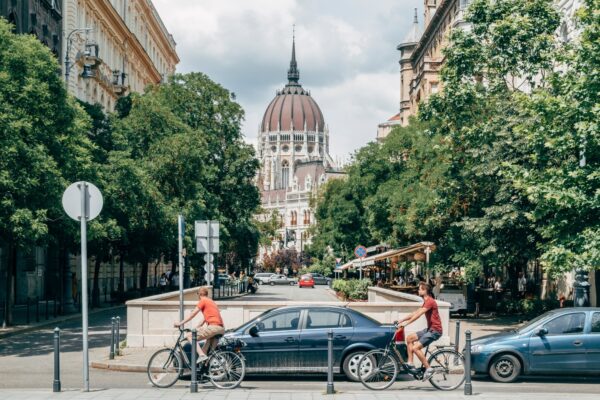Completed
Closing gaps in the passenger policy framework
Funder
Partners
WiseEuropa, Poland, 2celsius, Romania, DV Centras, Lithuania, Clean Air Action Group, Hungary
Share

Summary
Policies governing passenger transport emissions in Hungary, Lithuania, Poland, and Romania are inefficient due to numerous gaps and overlaps. The associated environmental and health costs also haven’t been fully addressed and solutions that could cut emissions and improve quality of life are not consistently promoted. Linkages with other sectors, such as urban planning, digitalisation, or employment, are not reflected in the policy framework.
The EUKI funded project ‘Beyond best practices in the transport sector’ aimed at providing recommendations to close these gaps, using best practice examples from other countries, regions and cities.
Transport Emissions Disaggregation Tool
Transport policies in the target countries were comprehensively mapped through the Transport Emissions Disaggregation Tool. The tool not only quantifies the impact of different factors driving emissions (such as emissions per vehicle, activity levels, or load factors), but also identifies measures that can reduce emissions, while increasing access to low carbon mobility options.
National findings
National analyses of key drivers in transport emissions were combined with cross-cutting policy recommendations in a series of technical reports and policy briefs. While report findings were varied depending on national circumstances, heavy reliance on personal cars and fractured public transportation networks are a common thread across the selected countries.
Hungary
Hungarian transport suffers from aged infrastructure and crippling inefficiencies, but clear transport policy can shift Hungary towards comprehensive public transport and personal mobility led by active transport. [report] [brief]
Lithuania
Lithuania faces similarly high reliance on personal cars and its public transport network lacks connectivity between suburban and urban communities – measures which disincentivise car use such as increased parking charges or walkable communities can help motivate a modal shift away from cars. [report] [brief]
Poland
In Poland, passenger transport is dominated by private cars and local governments struggle to develop the fragmented public transit system. Focussing on integrating bicycle and electric bus infrastructure can help close the gaps. [report] [brief]
Romania
Romania has significant emissions from the transport sector but has notable opportunities to decarbonise and expand rail infrastructure. [report] [brief]
Cities
The project further identified key transportation policy interventions on the local level for ten cities within the focus region, developing a report which seeks to support national-level recommendations with discrete and targeted interventions for local actors:
Cross-cutting findings
Further interlinkages with other policy areas and co-benefits that could aid a transformation towards zero emissions in passenger transport were examined in a series of horizontal papers focussing on cross-cutting topics in the transport arena:
- Cross-Border Public Transport Services
- Behavioural changes and transport sector decarbonisation
- Linkages between transport policy and other policy areas
- Utilisation of EU funds for the transformation of the transport sector
To ensure the ownership and relevance of the project’s results, it was carried out with strong involvement of local decision makers, mobility providers, and representatives of civil society, academia and industry.
This project is part of the European Climate Initiative (EUKI). EUKI is a project financing instrument by the German Federal Ministry for Economic Affairs and Climate Action. The EUKI competition for project ideas is implemented by the Deutsche Gesellschaft für Internationale Zusammenarbeit (GIZ) GmbH. It is the overarching goal of the EUKI to foster climate cooperation within the European Union (EU) in order to mitigate greenhouse gas emissions.



